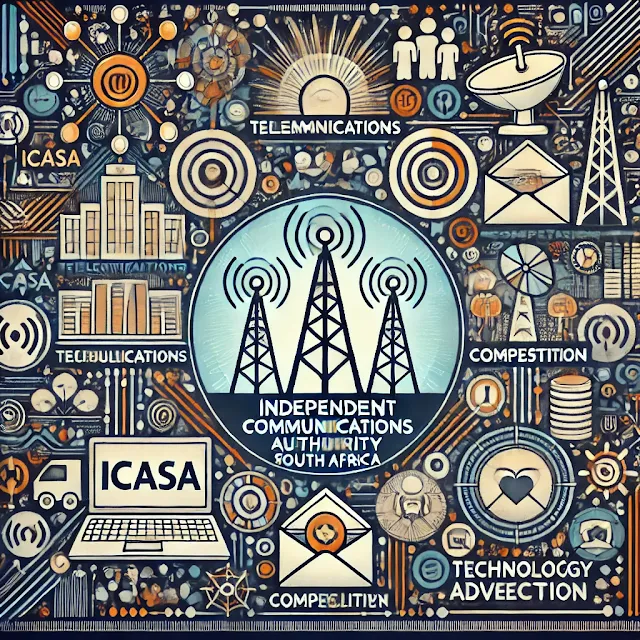Independent Communications Authority of South Africa - ICASA mandate is defined by several key acts and policies that guide its operations in regulating South Africa's communications, broadcasting, and postal sectors. Here’s a more detailed breakdown of its functions:
1. Telecommunications Regulation
ICASA oversees the telecommunications sector under the Electronic Communications Act (ECA) and the Telecommunications Act. Its role includes:
- Licensing: ICASA grants licenses to telecommunications providers, such as mobile networks and internet service providers (ISPs). Licenses are categorized into individual or class licenses, depending on the service scale.
- Setting Tariffs: ICASA regulates tariffs and rates for services to ensure fairness and prevent price exploitation.
- Service Standards: The regulator sets and monitors standards for service delivery, including coverage, quality, and reliability of services.
- Infrastructure Sharing: ICASA promotes the sharing of telecommunications infrastructure (such as cell towers and fiber networks) to prevent duplication and reduce costs.
2. Broadcasting Regulation
ICASA regulates both public and private broadcasters, ensuring compliance with the Broadcasting Act, which includes:
- Broadcasting Licenses: It allocates licenses to television and radio stations, including community and public broadcasters (e.g., the SABC).
- Content Regulations: ICASA enforces broadcasting standards that promote diverse programming, protect public morality, and ensure that local content quotas (e.g., South African music and shows) are met.
- Public Interest Broadcasting: ICASA ensures broadcasters serve the public interest, providing educational, informative, and entertainment content that caters to the needs of South Africa’s diverse population.
3. Radio Frequency Spectrum Management
Spectrum is a finite resource essential for telecommunications, broadcasting, and other wireless services. ICASA’s responsibilities in this area include:
- Allocation and Assignment: ICASA allocates frequency bands for different services (such as mobile networks, television broadcasting, and satellite communications) and assigns licenses to operators.
- Auctioning of Spectrum: ICASA conducts auctions for high-demand spectrum, such as the 5G spectrum, ensuring fair competition and maximizing public benefit.
- Interference Management: The regulator manages and monitors spectrum use to prevent harmful interference between different services using the airwaves.
4. Promoting Competition
ICASA plays a critical role in promoting and safeguarding competition within the communications sector by:
- Anti-competitive Behavior: It investigates and takes action against anti-competitive behavior, such as market dominance and unfair pricing practices.
- Market Regulation: ICASA ensures that smaller operators can compete with larger incumbents by setting rules for fair access to infrastructure and network sharing.
- Wholesale and Retail Price Regulation: The authority intervenes to regulate wholesale and retail prices, ensuring that they are fair and not excessively high, which helps protect consumers from exploitation.
5. Consumer Protection
ICASA’s consumer protection mandate is based on ensuring fairness, transparency, and quality service. It covers:
- Handling Complaints: ICASA provides a platform for consumers to lodge complaints regarding poor service, billing disputes, or false advertising by telecommunications and broadcasting companies.
- Quality of Service: The regulator sets minimum standards for service quality and monitors compliance through key performance indicators (e.g., call drops, network coverage).
- Contracts and Billing: ICASA oversees the transparency of contract terms and billing practices to prevent misleading terms or hidden fees.
6. Universal Service and Access
ICASA has a mandate to promote universal access to communication services across all regions of South Africa. It does this by:
- Connecting Underserved Areas: ICASA works to extend network services to rural and underserved areas through initiatives like the Universal Service and Access Fund (USAF), which finances the rollout of services to remote communities.
- Affordable Access: The authority sets frameworks that promote affordability of services, including voice, data, and internet access, particularly in marginalized communities.
- Bridging the Digital Divide: ICASA supports government efforts to bridge the digital divide by promoting digital literacy and ensuring that all citizens have access to modern communication tools.
7. Postal Sector Regulation
ICASA’s postal regulation mandate is in line with the Postal Services Act, which includes:
- Licensing Postal Operators: ICASA grants licenses to postal service providers, including the South African Post Office (SAPO) and private courier companies.
- Ensuring Delivery Standards: The authority ensures that postal services maintain quality standards in mail delivery times and customer service.
- Access to Postal Services: ICASA ensures that postal services are available nationwide, with a focus on extending services to rural areas and ensuring that SAPO meets its universal service obligations.
8. Compliance and Enforcement
ICASA has the authority to enforce compliance through penalties and fines for non-compliance with regulations or license conditions. It carries out regular inspections and audits of service providers and broadcasters to ensure adherence to standards.
9. ICT Policy Development
ICASA also collaborates with the Department of Communications and Digital Technologies on policy development and implementation. It provides input on the creation of laws and regulations that shape the ICT sector.
10. Public Consultation and Stakeholder Engagement
ICASA regularly conducts public consultations on important regulatory matters, such as spectrum allocation, pricing regulations, or new licensing frameworks. This helps ensure that all stakeholders, including the public, industry players, and government bodies, have a say in shaping the industry.
Legislative Framework
ICASA’s functions are supported by various legislative frameworks, including:
- Independent Communications Authority of South Africa Act (ICASA Act): Establishes ICASA as an independent regulator.
- Electronic Communications Act (ECA): Governs the regulation of electronic communications, broadcasting, and postal services.
- Broadcasting Act: Provides guidelines for broadcasting standards, public service broadcasting, and the SABC.
- Postal Services Act: Governs the regulation of postal services in South Africa.
By fulfilling these roles, ICASA ensures the effective regulation of the country's telecommunications, broadcasting, and postal sectors while promoting universal access and consumer rights.











